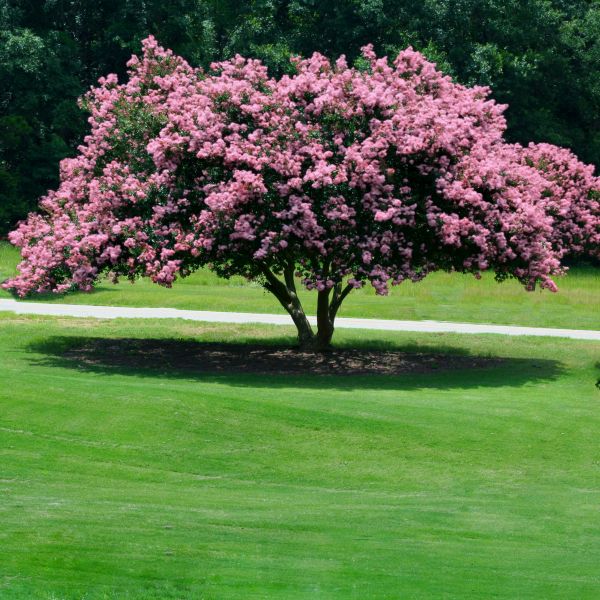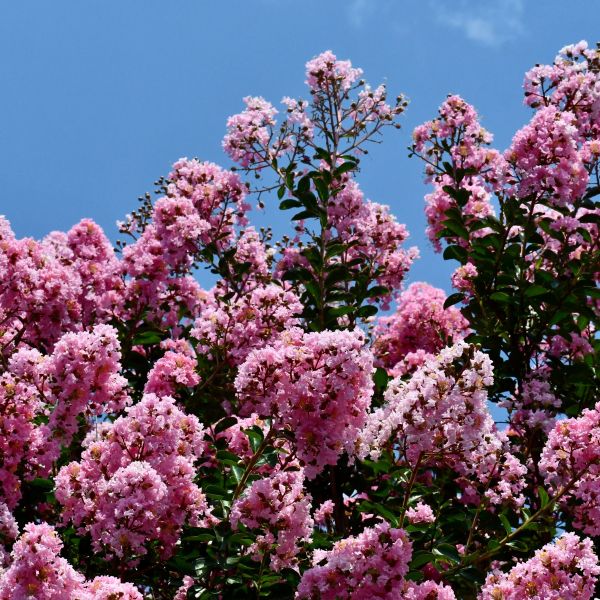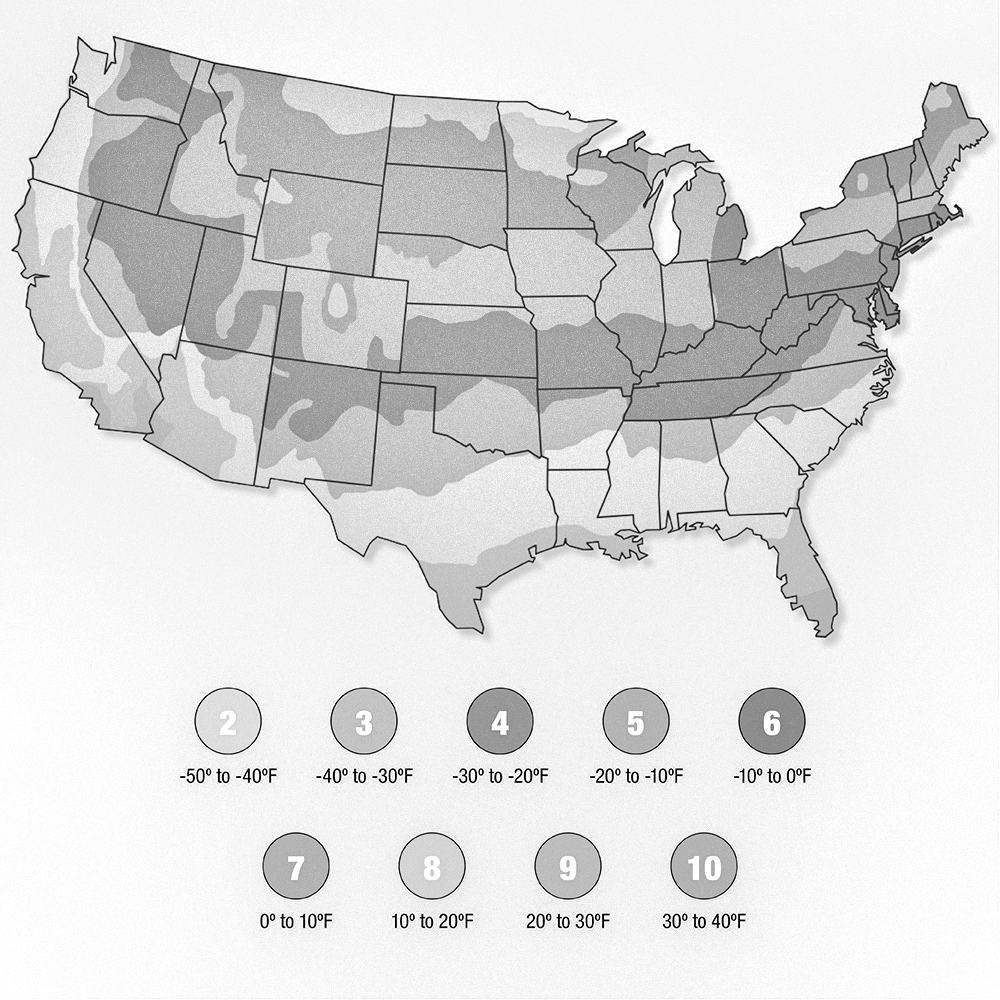


Sioux Crape Myrtle
Lagerstroemia indica x faueri 'Sioux'
90 reviews
Sioux Crape Myrtle
Lagerstroemia indica x faueri 'Sioux'
90 reviews
2.5 Gallon 3-4 Feet Multi Stem
We are sorry, product is currently out of stock due to seasonal availability. Please check the "Related plants available in your area" section below
Not just beautiful - intentionally selected by ShrubHub's 3D landscape design team to fit real-world spaces and maximize yard potential.
Why Sioux Crape Myrtle?
Sioux Crape Myrtle (Lagerstroemia indica x faueri 'Sioux') is a popular choice in landscaping for several reasons. This cultivar offers stunning, vibrant coral-pink flowers that bloom throughout the summer, adding a splash of color to any garden. Additionally, it boasts attractive peeling bark and glossy green foliage, providing year-round beauty. With its compact size and excellent disease resistance, the Sioux Crape Myrtle is a low-maintenance and visually appealing option for any garden or landscape.
Sunlight
Sioux Crape Myrtle prefers full sun exposure, requiring at least 6-8 hours of direct sunlight per day.
Watering
The Sioux Crape Myrtle has moderate watering requirements and should be watered regularly to keep the soil moist, especially during periods of dry weather.
Fertilizing
The fertilizer requirement for Sioux Crape Myrtle is a balanced, slow-release fertilizer with a ratio of 10-10-10 or 14-14-14. It should be applied in early spring and again in late summer, following the manufacturer's instructions.
Sioux Crape Myrtle (Lagerstroemia indica x faueri 'Sioux')
The Sioux Crape Myrtle, scientifically known as Lagerstroemia indica x faueri 'Sioux', is a deciduous shrub that belongs to the Lythraceae family. This stunning plant is a hybrid variety that combines the best characteristics of both Lagerstroemia indica and Lagerstroemia faueri species.
The Sioux Crape Myrtle is known for its exceptional beauty and impressive ornamental features. It typically grows to a moderate height of 15-20 feet, making it an ideal choice for adding vertical interest in gardens, landscapes, or as a standalone specimen. The plant forms an upright, multi-stemmed structure with a spreading, vase-shaped canopy that catches everyone's attention.
One of the standout features of the Sioux Crape Myrtle is its gorgeous, eye-catching flowers. During the summer months, this cultivar produces abundant clusters of large, crinkled blooms. The flowers showcase a vibrant deep coral-pink color, exuding a sense of elegance and creating a striking visual display. The blooms attract pollinators such as butterflies and bees, making it a great addition to pollinator gardens.
In addition to its stunning flowers, this Crape Myrtle variety offers a range of other appealing characteristics. The foliage of Sioux Crape Myrtle emerges as a deep green, transitioning to shades of bronze, orange, and red during the fall season, adding a stunning autumnal touch to any landscape. The tree's bark also provides interest, peeling off in attractive patches to reveal a smooth, light-colored trunk.
Sioux Crape Myrtle is known to thrive in full sun exposure, enabling it to display its best features. It prefers well-drained soils and is known for its durability and tolerance to drought, making it an excellent choice for various climates. This versatile plant can be used as a specimen tree, in groupings and borders, or even trained as an attractive hedge.
Overall, the Sioux Crape Myrtle is a stunning, low-maintenance shrub that brings beauty and interest to any garden or landscape. Its breathtaking flowers, attractive foliage, and remarkable bark make it a standout plant, worthy of consideration for both novice and experienced gardeners alike.
Plant Information:
| Botanical Name: | Lagerstroemia indica x faueri 'Sioux' |
| USDA Zones: | 6 - 9 |
| Water: | Moderate to Low Once Established |
| Exposure: | Full Sun |
| Soil Needs: | Well-Drained |
| Mature Height: | 12 - 15 feet |
| Mature Spread: | 8 - 10 feet |





Pollination Info
Pollination Information for Sioux Crape Myrtle
The Sioux Crape Myrtle (Lagerstroemia indica x faueri 'Sioux') is a beautiful flowering tree that requires proper pollination for optimal growth and abundant blooms. Here are some important details regarding its pollination:
Pollination Type:
The Sioux Crape Myrtle is primarily pollinated by insects, including bees, butterflies, and other nectar-seeking insects. These insects facilitate the transfer of pollen between flowers, helping in the fertilization process.
Pollination Requirements:
- Flower Maturity: The tree must reach maturity and start producing flowers for successful pollination. This typically occurs when the plant is around 2-4 years old.
- Presence of Pollinators: To enhance pollination, it is advisable to have a variety of pollinators present in the vicinity, as they will help increase the chances of successful pollination.
- Proximity to Other Crapemyrtle Varieties: If you have other Crapemyrtle varieties in the vicinity, cross-pollination can occur, leading to potential genetic variation and improved vigor in offspring plants.
Signs of Successful Pollination:
After successful pollination, the flowers of the Sioux Crape Myrtle will develop fruits that contain the seeds. These fruits, commonly called capsules or seed pods, will start forming after the pollination process is completed. The capsules gradually mature and eventually release the seeds.
Pollination Tips:
- Planting Location: Choose a location that attracts pollinators, such as a sunny area with a variety of plants that produce nectar and flowers attractive to insects.
- Maintain a Healthy Garden: Ensure your Sioux Crape Myrtle remains healthy by providing proper watering, fertilization, and regular pruning to encourage strong growth and an abundance of flowers.
- Avoid Pesticides: Refrain from using pesticides, particularly during the peak blooming season, as they might harm the pollinators that are crucial for successful pollination.
- Encourage Native Pollinators: Consider planting native flowering plants alongside your Sioux Crape Myrtle to attract a diverse range of native pollinators.
By understanding and implementing the necessary steps for pollination, you can help ensure that your Sioux Crape Myrtle thrives and produces stunning blooms year after year.
FAQ
Sioux Crape Myrtle (Lagerstroemia indica x faueri 'Sioux') FAQ
General Information
1. What is Sioux Crape Myrtle?
Sioux Crape Myrtle (Lagerstroemia indica x faueri 'Sioux') is a deciduous shrub or small tree known for its stunning summer flowers and attractive bark.
2. What is the maximum height and spread of Sioux Crape Myrtle?
Sioux Crape Myrtle typically reaches a height of 20 to 25 feet (6 to 7.5 meters) with a spread of 15 to 20 feet (4.5 to 6 meters).
Growth and Care
3. What is the best planting location for Sioux Crape Myrtle?
Sioux Crape Myrtle thrives in full sun and well-draining soil. It is best to select a planting location that receives at least 6 hours of direct sunlight per day.
4. When is the best time to plant Sioux Crape Myrtle?
It is recommended to plant Sioux Crape Myrtle in spring or fall, when the temperatures are moderate. Avoid planting during extreme heat or frost.
5. How often should I water Sioux Crape Myrtle?
After the initial planting, water the shrub deeply once or twice a week for the first few weeks. Once established, it is relatively drought-tolerant but will benefit from regular watering during dry spells.
6. Does Sioux Crape Myrtle require pruning?
Pruning is not required for Sioux Crape Myrtle, but it can be done in late winter or early spring to shape the plant and encourage new growth. Remove any dead or damaged branches as necessary.
7. How often should I fertilize Sioux Crape Myrtle?
Apply a slow-release balanced fertilizer in early spring before new growth begins. Repeat the application in late spring or early summer if desired.
Flowering and Dormancy
8. When does Sioux Crape Myrtle bloom?
Sioux Crape Myrtle produces vibrant flowers from early to mid-summer, usually in shades of pink or purple. The blooming period can last for several weeks.
9. Does Sioux Crape Myrtle lose its leaves in winter?
Yes, Sioux Crape Myrtle is deciduous and sheds its leaves in winter, entering a period of dormancy. The attractive bark adds interest to the garden during the colder months.
10. Is Sioux Crape Myrtle resistant to diseases and pests?
Sioux Crape Myrtle is generally resistant to common diseases. However, it can occasionally be affected by powdery mildew or aphids. Proper care, including good airflow and regular inspection, can help prevent and treat these issues.
11. Can Sioux Crape Myrtle tolerate cold climates?
Sioux Crape Myrtle is hardy in USDA Zones 7 to 9. It may suffer damage or die back in colder climates, but it often regenerates from the base in spring.
Planting & Care
Check Out These Verified Customer Reviews:
Customer Reviews
4.7 out of 5 based on 90 reviews
Thank you! Your review has been submitted.
Arrived in good condition, easy to plant and care for
Highly recommend this plant.
Impressed with the quality of the plant and packaging
Item has been added to your cart.


